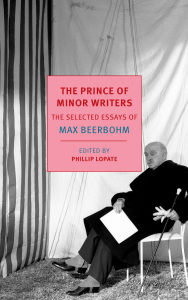 At the end of his tenure as drama critic of The Saturday Review, George Bernard Shaw took it upon himself to name his successor, and after a string of interviews he lit upon Max Beerbohm, sealing his approval with a sentence that has dogged the younger man ever since: “The younger generation is knocking at the door, and as I open it there steps sprightly in the incomparable Max.” The Prince Of Minor Writers is not a title Beerbohm ever gave to his own work, but was chosen by his anthologist, the equally emanate essayist Philip Lopate, who has done us a wonderful service in making Beerbohm’s best essays available in a single volume.
At the end of his tenure as drama critic of The Saturday Review, George Bernard Shaw took it upon himself to name his successor, and after a string of interviews he lit upon Max Beerbohm, sealing his approval with a sentence that has dogged the younger man ever since: “The younger generation is knocking at the door, and as I open it there steps sprightly in the incomparable Max.” The Prince Of Minor Writers is not a title Beerbohm ever gave to his own work, but was chosen by his anthologist, the equally emanate essayist Philip Lopate, who has done us a wonderful service in making Beerbohm’s best essays available in a single volume.
His title is both a reference to Beerbohm’s avowed lack of literary ambition, and the utter and undeniable success he achieved within his own scope, with a passing reference to Roberto Bolaño’s summary: “The great Max Beerbohm may be the paradigm of the minor writer and the happy man. In other words: Max Beerbohm was a good and gracious soul.” Beerbohm himself is happy to defend his choice not to pursue literary immortality. He closes one essay, for example, with a defense of the music halls, which were looked down upon as a frivolous entertainment: “I am inclined to think, indeed I have always thought, that a young man who desires to know all that in all ages and in all lands has been thought by the best minds, and wishes to make a synthesis of all those thoughts for the future benefit of mankind, is laying up for himself a very miserable old age.” He is right, of course, and he is far too fun-loving to resign himself to such a dreary life. And at the same time there is a sly note in all his self-deprecating, as when he boasts that he rarely reads. He describes himself as “loath to obey, loath to command,” a “Tory Anarchist” who would “like everyone to go about doing just as he pleased – short of altering any of the things to which I have grown accustomed.”
It is tempting to reduce him to aphorisms, the short, pithy sentences that punctuate so many of his paragraphs and are so deliciously quotable: “During the War one felt it a duty to know the worst before breakfast; now that the English polity is threatened merely from within, one is apt to dally…” or “Only the insane take themselves quite seriously,” but this does violence to his skill as an essayist, his pitch-perfect tone and timing, and his habit of beginning an essay in the specific, even the mundane – say, a travelling hat locker or a chance meeting with a stranger abroad – and leading his reader, almost without his reader realizing it, wherever his mind happens to stray. An essay on the reading material available at train stations, for example, quickly becomes an excuse for satirical letter-writing, provoked by Max’s discovery of a book designed to instruct letter writing “by dint of more or less strict adherence to sample.” This prompts Max to create various characters, from a man angry with his local politician (“It is such men as you that lower the tone of public life”) to a woman refusing an invitation to a class reunion (“ps, I often rite to people telling them where I was edducated and highly reckomending you”). Another, “Quia Imperfectum,” begins on the subject of unfinished works of art and becomes an extended meditation on the greatness of Goethe:
Endearing though failure always is, we grudge no man a moderately successful career, and glory itself we will wink at if it befall some thoroughly good fellow. But a man whose career was glorious without intermission, decade after decade, does sorely try our patience.
Several of his essays deal with the subject of fire – its destructiveness, its elemental beauty, and its centrality in our lives. “Fire is the only one of the elements that inspires awe. We breathe air, tread earth, bathe in water. Fire alone we approach with deference.” Then, in “An Infamous Brigade,” he undercuts his own high-mindedness when he sights a wharf on fire and takes a cab to enjoy the view. No sooner does he arrive then “under my very eyes, there was an organized attempt to spoil this fair thing.” He imagines taking a pen-knife to the fire hoses and organizing an entire brigade of people to thwart the efforts of firemen all over London. “The sentimentalist may prattle of life-saving, but we must think, rather, of the greatest happiness of the greatest number,” he argues. “Nothing is easier than to be an incendiary. All you want is a box of matches and a sense of beauty.”
The arsonist and the satirist have something in common; both practice arts that are essentially destructive. But to read Max Beerbohm, to follow his active mind from subject to subject by way of his prose, is to know that he does indeed possess a sense of beauty.